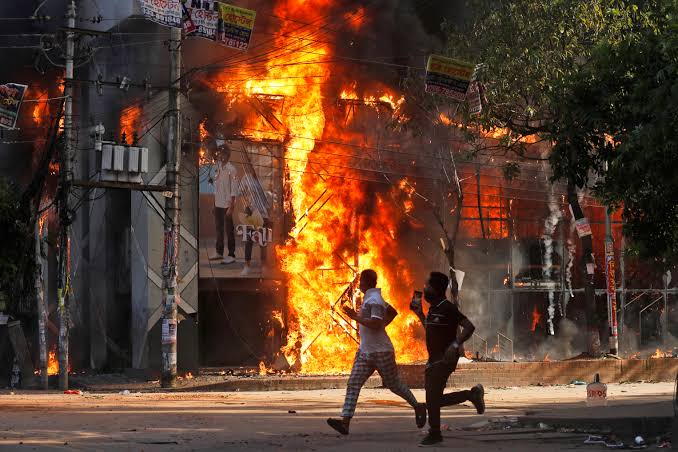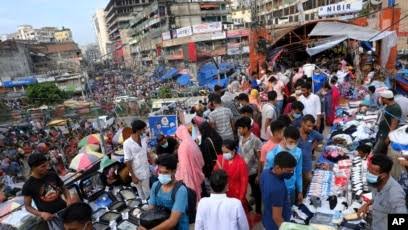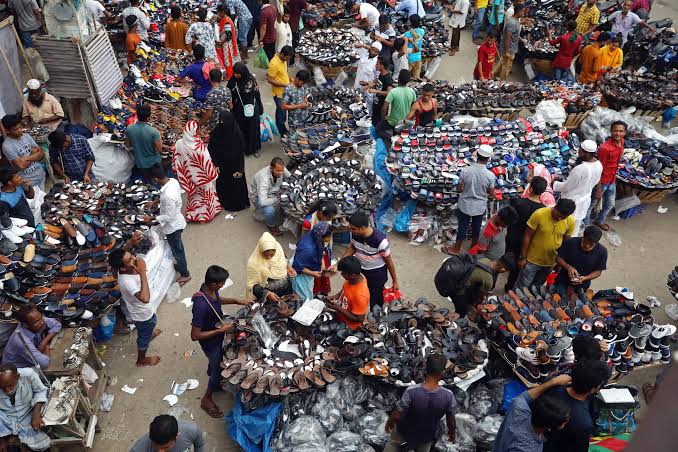Bangladesh is going through unusual political chaos, which is putting a lot of stress on the economy. The student protests that started on July 1 have not only shook the country, but they have also done a lot of damage to its economy. The crisis hit a breaking point when Prime Minister Sheikh Hasina took a helicopter to leave the country in the middle of the night. Bangladesh’s economy is in shambles after this quick and dramatic turn of events. The country is expected to lose billions of dollars.
Protests, which were caused by broad anger at the government, have shut down important parts of the economy. There has been chaos in the business world as factories have been shut down and transportation has been slowed down. As the future of the country is uncertain, this unrest is having an impact on all parts of society, from small businesses to big corporations.

Protest-Ridden Streets: “Bangladesh in turmoil: Student protests shake the nation, leaving the economy in crisis.
Even though the chaos is still going on, the fact that Nobel Peace Prize winner Muhammad Yunus was chosen to lead a temporary government gives people hope. People around the world know Yunus for his work in microfinance and reducing poverty. He is seen as someone who can bring back security and fix the deep-seated problems that led to the protests. But they have a hard job ahead of them because Bangladesh is in a dangerous and complicated position that many people are calling “uncharted territory.”
Bangladeshi businesses are having a hard time adjusting to this new situation. Many people don’t know what to do next because recent events have been so unusual. Since politics are changing so quickly, it’s hard to make plans for the long run. Foreign investors have been very important to Bangladesh’s economic growth for a long time, but they are now rethinking their positions because they are worried about the risks that come with the ongoing unrest.
The effects have been especially bad on Bangladesh’s garment business, which is an important part of the country’s economy. A big chunk of the country’s export income comes from this sector, which has been hit hard by plant closings and problems in the supply chain. As things keep changing, workers who depend on these jobs for their income are facing more and more insecurity.

Muhammad Yunus Addressing a Crowd. A new hope? Nobel Laureate Muhammad Yunus steps in to guide Bangladesh through uncharted political waters. There is also a lot of stress in the banking sector. Banks are seeing more volatility, and the taka, the national currency, is losing value against the dollar. This economic pressure is making things harder for the temporary government as it tries to take steps to stabilize the economy and win back the trust of people in the country and around the world.
Even with these problems, some people are cautiously optimistic that Yunus can help Bangladesh get through this crisis thanks to his name and experience. He is focusing on economic and social equality, which could help solve some of the problems that have led to the current unrest. There is, however, a lot that depends on how well the interim government can balance political change with economic recovery.

Empty Factory Floor: “Economic fallout: Bangladesh’s garment industry stands still amid political chaos.
In conclusion, Bangladesh’s economy is in a bad spot because of unusual political chaos. The nationwide student protests have had a big impact on the economy, with losses believed to be in the billions. As Nobel Peace Prize winner Muhammad Yunus leads a temporary government, there is hope that the country’s deep-seated problems with inequality can be fixed. But the road ahead is difficult, and it’s still not clear what will happen with Bangladesh’s economy.